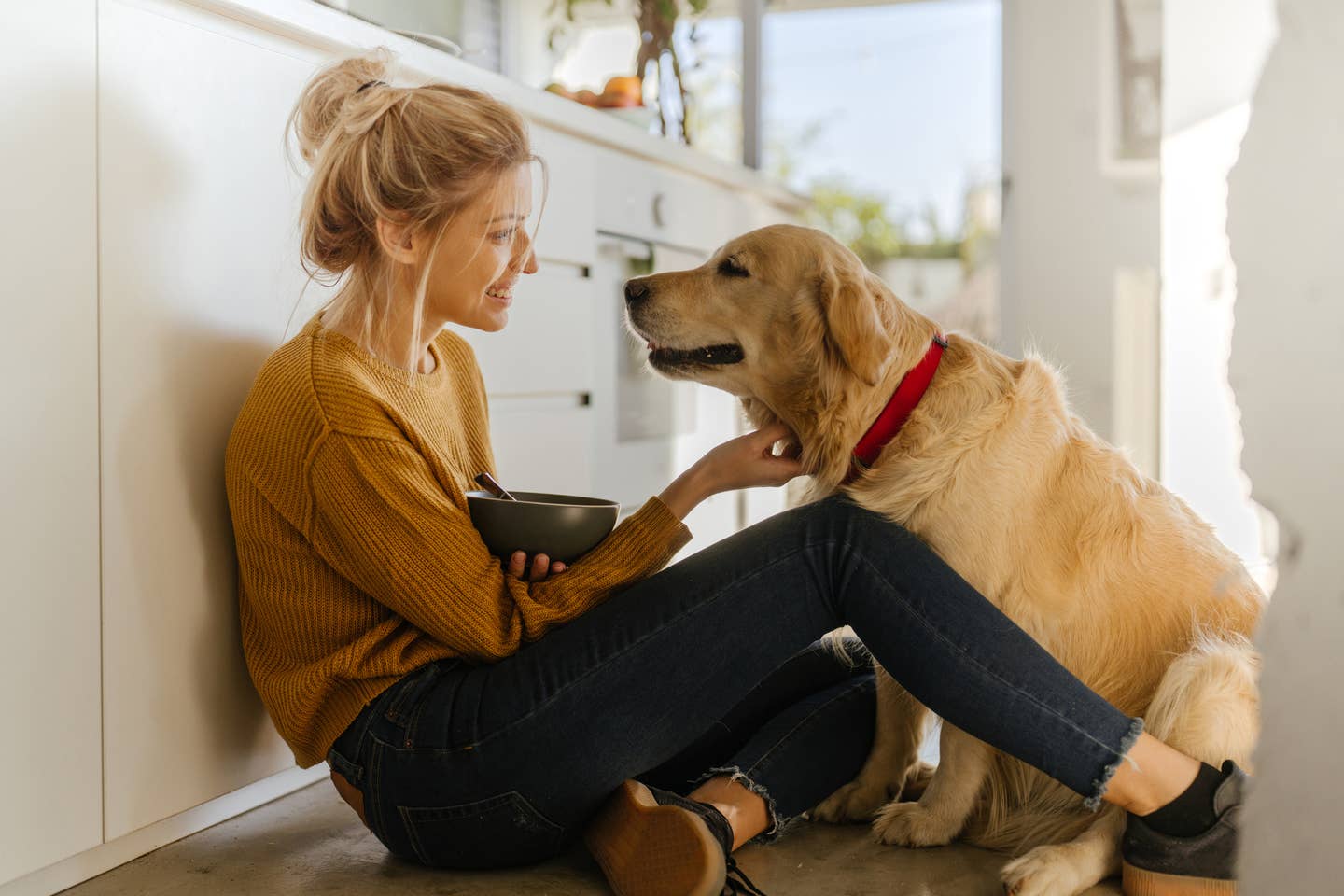
“I Fed My Dog Plant-Based Dog Food and Here’s What Happened”
There are debates online about whether it's "cruel" to feed your dog vegan pet food, or whether it's actually healthy to feed your dog plant-based food, at least some of the time. If your dog has digestive issues, as mine does, it may work to clear them up if you switch it up and give your pet a plant-based meal for at least one meal a day. It certainly did the trick to help clear up my 4-year-old sheep dog's stomach troubles. The people who think it's unfair to impose vegan sensibilities onto dogs argue that dogs need meat, since after all, canines are the descendants of wolves, which are carnivorous animals, so of course, dogs need (and love) chicken, meat, fish, and eggs.
On the vegan side of the argument, there are dozens of vegan vets who believe that it is safe, healthy, and ethical to feed your dog a plant-based diet. “Because dogs can be considered omnivores, what you might call facultative carnivores, they can survive with or without meat in their diet, provided they’re consuming essential nutrients in appropriate quantities,” says Sarah Dodd, a veterinarian and a researcher at the Ontario Veterinary College, University of Guelph, Canada.
If you fall somewhere in the middle of the argument, and eat plant-based but are curious as to whether your pooch should join you in the plant-based pet food aisle, read on and find out what happened when I treated my dog's stomach issues with plant-based food, and what really worked to clear up her (ahem) soupy poopies, as we call it in my house.
Our dog has a very sensitive stomach and the slightest thing can set it off. Let's get real: She has a soft stool problem. Not to be indelicate here, but waking up early in the morning to take her out for a walk or run and discovering that she had an overnight explosion is never fun. More times than I would like to admit, I have had to start my day by cleaning diarrhea out of our lovely wool rugs. It is something I have gotten very good at (tip: use soda water, wet towels, and a small dollop of shampoo, then do the twist on the wet towels, over and over).
What do you do with a picky-eater dog?
Bonnie, a rescue, is a large white four-year-old Maremma (an Italian breed of sheepdog related to the Great Pyranneas) who weighs in at just under 60 pounds. She is house trained, but not "outdoor" obedient, and she loves to drink bay water. I have now learned that is a very bad idea. It gives her explosive poops and I inevitably have to take her to the vet for help.
Every vet visit involves me being told Bonnie is "underweight," and yet getting her to eat is a challenge. She turns her nose up at kibble and loves anything humans eat, but when she tries even the smallest bite of human food, especially anything greasy, she turns into a liquefier of food, and the walks are frequent, the poops soupy, and the overnights unbearable. So in my effort to figure out how to feed her food that she will eat and love that won't turn her stomach into knots, I turned to plant-based dog food. It certainly couldn't hurt!
The type of plant-based dog food we tried is not technically vegan since it contains eggs, but it is a plant-based formula from Fresh Pet called Spring and Sprout. I have also tried her out on the vegan dog food Wild Earth, a "clean plant-protein" based food, which she liked but didn't keep liking as the days wore on, and she also tried out sweet potato jerky from Petaluma, which I thought she would love, but which she roundly rejected. Bonnie is an omnivore, though she will fight you for a "Greenie," which is her favorite treat, and they're plant-based. Here's what I learned about plant-based dog food and sensitive stomachs.
Is it safe to feed your dog vegan food?
Most vets will tell you that dogs, like people, need a variety of antioxidants and nutrients. They do best with a varied diet, and when possible, you need to keep them lean, active, and not overfed. That means that your dog, like mine, is likely to thrive on a variety of different food, and some of it, at least can or even should be plant-based.
So the way to introduce plant-based dog food to your dog is to do it gradually. Mix it with his or her favorite kibble and other food, and then change the balance over a few days so that the plant-based mix is the majority of the plate. I did this and eventually, it became her favorite, and it helped clear up her stomach woes. The formula is gentler on her gut and full of fiber-filled ingredients like fruits and vegetables, along with plant-based protein.
Along with stripping out the chicken and meat, this helped to clear up Bonnie's tummy troubles. But along with giving her this, I also added probiotics to her dish, which worked miracles. So for stomach troubles, try a combination of pumpkin puree (organic only) as well as plant-based dog food and probiotics.
Do probiotics work for dog digestion?
Probiotics appear to do everything they are designed to do: Strengthen digestion, clear up any bacterial or viral infection, and aid in overall health. I know this because it is the one thing that consistently helps Bonnie. Reading up on probiotics, it is safe to give your dog the human kind but the species-specific ones are more effective, so get yours at a pet store and then keep them in the fridge so the live bacteria last longer.
What's bad for a dog's gut? Saltwater. When I take Bonnie to the charming bay beach near my house on weekends for a romp off the leash in the early morning, Bonnie has a tendency to drink the salt water, which I now know from painful experience, is a trigger for her diarrhea. By that night, things have gone south. It's as if the saltwater is going right through her, in waves.
So I now have learned to have her medicine at the ready, but instead of over-medicating her, I have learned that her soft poops clear up when she has a little pumpkin puree in with her food. The fiber helps things turn around, but she doesn't love pumpkin and more often than not I have had to throw it away. So I started looking for other remedies that are just as natural and as effective.
Probiotics are effective in aiding dog digestion, and from my experience with Bonnie, seem to be a miracle ingredient in her food bowl. The first time I was given probiotics for her upset stomach was in LA, where Bonnie had a virus or some other cause for persistent diarrhea. Luckily the vets there are very progressive and anti-medicating, and I was fairly skeptical when instead of a prescription they sent me home with probiotics. I gave her the capsules and then when she got clever and started to spit them back out (like some clever patient in a movie) I began just opening the caplet and sprinkling the white powder onto her food and in just one day her situation cleared up. I was sold.
So while nothing is a cure-all and I would not want to deprive your animal of the taste of meat or chicken, I would highly recommend feeding your dog plant-based dog food at least some of the time, especially if they are coping with digestive issues. Your dog may take to it, as mine did, but either way, plant-based – at least some of the time – is a healthy choice for both dogs and humans alike.
Bottom Line: Plant-based dog food full of vegetables and fruit is great for your dog's digestion
When your dog comes down with stomach troubles, use a combination of pure organic pumpkin, plant-based dog food, and probiotics to naturally treat their digestive issues. The dog will be healthier for it and your rugs will thank you.
For more product recommendations, visit The Beet's plant-based product reviews.
More From The Beet






